BusinessEurope Headlines No. 2022-23
Meetings with VP Dombrovskis and Commissioner Schmit on social dialogue
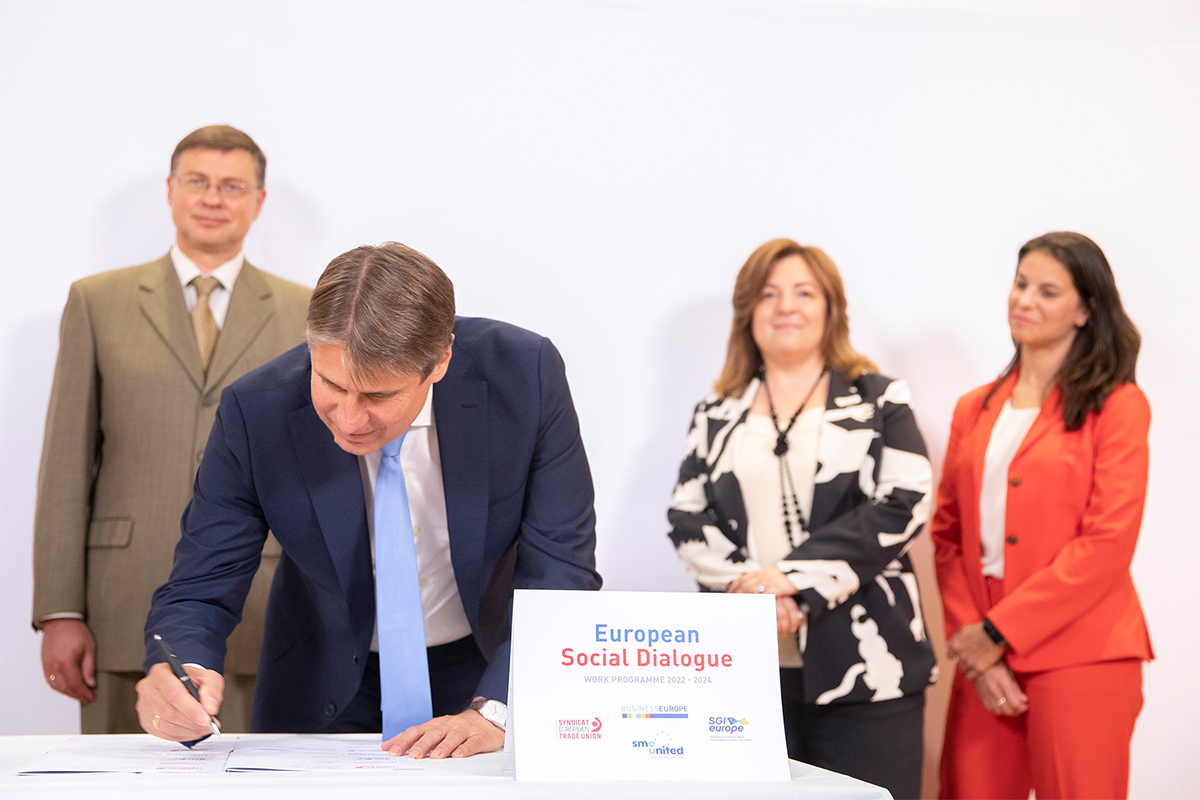
The goal is clear: through an improved quadri-partite cooperation, we aim to achieve altogether better performing labour markets and social systems in the EU Member States, making best possible use of social dialogue as a vehicle for improved policy-making at EU and national levels on employment and social issues. This was the main message from BusinessEurope Director General Markus J. Beyrer when discussing the European Commission’s upcoming social dialogue initiative with Commissioner for Jobs and Social Rights Nicolas Schmit on 24 June. This meeting took place just a few days before the launch of the European social partners new work programme for the period 2022-24, in the company of the European Commission Executive Vice-President Valdis Dombrovskis on 28 June. On this occasion, Beyrer commented that each of the 6 items in the work programme are priorities in their own right. “At the same time, we have to note the significance of the decision that our organisations have taken to negotiate a legally-binding agreement on telework and the right to disconnect. As we will enter the negotiations on this agreement in the autumn, we will do so with the knowledge that social partners and social dialogue have a fundamental role to play in making our labour markets more productive, competitive and resilient as we seek to mobilise the economic recovery from COVID against the backdrop of a challenging geopolitical, economic and social context”, he said. The social dialogue initiative comprises a Commission Communication and a Council Recommendation and is set to be published around the end of September/October. The European social partners will start implementing their new work programme in the autumn, starting with the negotiations on telework and the right to disconnect.
Contact: Robert Plummer
Chemicals regulation: from European industry to society
 “The revision of the chemicals’ regulation needs to be very well calibrated and strike the right balance between the necessary ambition and the need to avoid irreversible collateral damage on our industrial landscape”, stated Director General Markus J. Beyrer at the high-level conference on the upcoming revision of the EU chemicals legislation, organised by BusinessEurope on 30 June. With the participation of Martin Brudermüller, Chief Executive Officer of BASF, the debate underlined that the currently foreseen reform will go far beyond the chemical sector and affect all industries along the value chain. Together with the European Commission representatives, trade unions, NGOs and industry, the conference discussed the implications of moving from a risk-based to a hazardous-based chemical policy, the interplay between the REACH (registration, evaluation, authorisation and restriction of chemicals) and OSH (occupational safety and health) legislations and ways to make the “essential use” concept work. On the latter, Beyrer stressed that “the essential use concept could be a valid solution only if applied in a targeted manner, in case of unmanageable proven risks and if no acceptable alternatives exist.” See photos of the event.
“The revision of the chemicals’ regulation needs to be very well calibrated and strike the right balance between the necessary ambition and the need to avoid irreversible collateral damage on our industrial landscape”, stated Director General Markus J. Beyrer at the high-level conference on the upcoming revision of the EU chemicals legislation, organised by BusinessEurope on 30 June. With the participation of Martin Brudermüller, Chief Executive Officer of BASF, the debate underlined that the currently foreseen reform will go far beyond the chemical sector and affect all industries along the value chain. Together with the European Commission representatives, trade unions, NGOs and industry, the conference discussed the implications of moving from a risk-based to a hazardous-based chemical policy, the interplay between the REACH (registration, evaluation, authorisation and restriction of chemicals) and OSH (occupational safety and health) legislations and ways to make the “essential use” concept work. On the latter, Beyrer stressed that “the essential use concept could be a valid solution only if applied in a targeted manner, in case of unmanageable proven risks and if no acceptable alternatives exist.” See photos of the event.
Contact: Alexandre Affre
Business environment in China keeps getting more politicised
 “EU-China relations have faced considerable challenges in recent times. On the one hand, our trade and investment relations remain characterised by significant asymmetries, a lack of reciprocity in market access and of a level playing field. On the other hand, new risk factors, such as China’s increased assertiveness and the supply chain disruptions resulting from China’s zero-COVID policy, have emerged”, said Luisa Santos, Deputy Director General of BusinessEurope, at a webinar on the results of the Business Confidence Survey 2022 conducted by the European Union Chamber of Commerce in China (EUCCC). Santos moderated the event, which took place on 28 June and was co-organised by BusinessEurope, the EU-China Business Association, and the EUCCC. At the event, EUCCC Vice President Bettina Schön-Behanzin presented the main findings of the survey. The document shows that in 2021 the business environment in China continued to become increasingly politicised and reform efforts throughout the year were lacklustre, with traditional complaints—such as market access restrictions, an unlevel playing field and regulatory inefficiencies—still present. Despite this, European companies continued to demonstrate their commitment to China by identifying new ways to contribute to its growth story while advocating for deeper reforms. As the surveys underlying the publication were conducted before the Russian invasion of Ukraine and the mass lockdowns in China, it is complemented with an additional flash survey conducted in April to better understand the impact of these events on European businesses in China. “In the current context, it is crucial for European companies to thoroughly assess the short- and long- term risks deriving from their overreliance and exposure to the Chinese market and take mitigating measures”, Santos concluded.
“EU-China relations have faced considerable challenges in recent times. On the one hand, our trade and investment relations remain characterised by significant asymmetries, a lack of reciprocity in market access and of a level playing field. On the other hand, new risk factors, such as China’s increased assertiveness and the supply chain disruptions resulting from China’s zero-COVID policy, have emerged”, said Luisa Santos, Deputy Director General of BusinessEurope, at a webinar on the results of the Business Confidence Survey 2022 conducted by the European Union Chamber of Commerce in China (EUCCC). Santos moderated the event, which took place on 28 June and was co-organised by BusinessEurope, the EU-China Business Association, and the EUCCC. At the event, EUCCC Vice President Bettina Schön-Behanzin presented the main findings of the survey. The document shows that in 2021 the business environment in China continued to become increasingly politicised and reform efforts throughout the year were lacklustre, with traditional complaints—such as market access restrictions, an unlevel playing field and regulatory inefficiencies—still present. Despite this, European companies continued to demonstrate their commitment to China by identifying new ways to contribute to its growth story while advocating for deeper reforms. As the surveys underlying the publication were conducted before the Russian invasion of Ukraine and the mass lockdowns in China, it is complemented with an additional flash survey conducted in April to better understand the impact of these events on European businesses in China. “In the current context, it is crucial for European companies to thoroughly assess the short- and long- term risks deriving from their overreliance and exposure to the Chinese market and take mitigating measures”, Santos concluded.
Contact: Benedikt Wiedenhofer
Meeting with WTO Deputy Director General Paugam
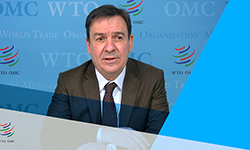 During a visit of the Deputy Director General of the World Trade Organisation (WTO), Jean-Marie Paugam to BusinessEurope on 27 June, Luisa Santos, Deputy Director General of BusinessEurope reiterated our support for rules-based multilateral trade and a robust WTO. The discussion focused on the outcomes of the recent 12th Ministerial Conference (MC12) and the follow up steps that the WTO and its members are currently focusing on to deliver on the outcome, including on the TRIPS (Trade-Related Aspects of Intellectual Property Rights) waiver, the e-commerce work programme and moratorium as well as the commitment to reform the organisation. It is clear that the next months will be critical in this regard and that WTO members need to keep the momentum and build on the deliverables of MC12, but also seek progress in other important areas. For instance, a key priority for business is achieving ambitious results in the framework of the so-called Joint Statement Initiatives, such as those on e-commerce and environmental sustainability. BusinessEurope will soon organise a meeting with its members to take stock of the MC12 and discuss opportunities to engage with the WTO.
During a visit of the Deputy Director General of the World Trade Organisation (WTO), Jean-Marie Paugam to BusinessEurope on 27 June, Luisa Santos, Deputy Director General of BusinessEurope reiterated our support for rules-based multilateral trade and a robust WTO. The discussion focused on the outcomes of the recent 12th Ministerial Conference (MC12) and the follow up steps that the WTO and its members are currently focusing on to deliver on the outcome, including on the TRIPS (Trade-Related Aspects of Intellectual Property Rights) waiver, the e-commerce work programme and moratorium as well as the commitment to reform the organisation. It is clear that the next months will be critical in this regard and that WTO members need to keep the momentum and build on the deliverables of MC12, but also seek progress in other important areas. For instance, a key priority for business is achieving ambitious results in the framework of the so-called Joint Statement Initiatives, such as those on e-commerce and environmental sustainability. BusinessEurope will soon organise a meeting with its members to take stock of the MC12 and discuss opportunities to engage with the WTO.
Contacts: Sofia Bournou, Elena Suárez
Photo copyright: WTO
A 180 degree shift across the EU-27 is needed to further deepen the Single Market
 On 27 June, BusinessEurope, DIGITALEUROPE, European Round Table for Industry (ERT), Eurochambres and EuroCommerce published a joint statement calling for fresh political engagement to renew economic integration in the Single Market. The statement was addressed to the European Commission, Member States and the European Parliament. New economic and geopolitical realities do not allow Europe staying where it has been for the last decade in terms of the Single Market integration and approaches taken towards regulation. The five key business organisations of Europe express deep concerns that real lack of political ambition and administrative inaction in the EU have a cost on the prosperity of Europeans and put a serious brake on Europe’s economic recovery in the coming decade. With a clear sense of urgency, we put forward a set of key recommendations for immediate action.
On 27 June, BusinessEurope, DIGITALEUROPE, European Round Table for Industry (ERT), Eurochambres and EuroCommerce published a joint statement calling for fresh political engagement to renew economic integration in the Single Market. The statement was addressed to the European Commission, Member States and the European Parliament. New economic and geopolitical realities do not allow Europe staying where it has been for the last decade in terms of the Single Market integration and approaches taken towards regulation. The five key business organisations of Europe express deep concerns that real lack of political ambition and administrative inaction in the EU have a cost on the prosperity of Europeans and put a serious brake on Europe’s economic recovery in the coming decade. With a clear sense of urgency, we put forward a set of key recommendations for immediate action.
![]() Contact: Martynas Barysas
Contact: Martynas Barysas
Labour shortages: the greatest headache for businesses – what can be done?
 The current economic context is far from being comfortable: high inflation and energy prices, the disruptions caused by the Russian aggression in Ukraine and serious labour force and skills shortages across all EU Member States and all sectors. Labour force shortages have already been problematic for businesses before the COVID pandemic but have aggravated even more in the post-COVID recovery. The twin transition - green and digital – is putting additional stress as it causes profound structural changes across occupations and jobs, as well as skills requirement. BusinessEurope has recently published its policy orientation note titled Labour force and skills shortages: how to tackle them?. Labour shortages are mainly caused by ageing and shrinking working population, relatively high inactivity rate, relatively low mobility in the EU, and low effectiveness of matching between offered jobs and available labour supply. There are two main strategies to tackle labour shortages: (re-) engaging people further from the labour market and increasing labour force through orderly migration. Short-term and long-term measures are discussed in the note and illustrated by examples of effective national solutions. BusinessEurope encourages the European Commission to include in its 2023 work programme an action plan aiming to give shape to a well-coordinated EU strategy drawing on EU employment, skills, single market and migration policies. The Employment, Social Policy, Health and Consumer Affairs Council’s Employment Committee (EMCO) has a key role to play to coordinate Member States’ policy responses to growing labour and skills shortages. On 27 June, BusinessEurope’s proposals on how to tackle labour shortages were discussed with different stakeholders during the roundtable discission “Labour shortages across sectors and supply chains”, organised by European Movement International.
The current economic context is far from being comfortable: high inflation and energy prices, the disruptions caused by the Russian aggression in Ukraine and serious labour force and skills shortages across all EU Member States and all sectors. Labour force shortages have already been problematic for businesses before the COVID pandemic but have aggravated even more in the post-COVID recovery. The twin transition - green and digital – is putting additional stress as it causes profound structural changes across occupations and jobs, as well as skills requirement. BusinessEurope has recently published its policy orientation note titled Labour force and skills shortages: how to tackle them?. Labour shortages are mainly caused by ageing and shrinking working population, relatively high inactivity rate, relatively low mobility in the EU, and low effectiveness of matching between offered jobs and available labour supply. There are two main strategies to tackle labour shortages: (re-) engaging people further from the labour market and increasing labour force through orderly migration. Short-term and long-term measures are discussed in the note and illustrated by examples of effective national solutions. BusinessEurope encourages the European Commission to include in its 2023 work programme an action plan aiming to give shape to a well-coordinated EU strategy drawing on EU employment, skills, single market and migration policies. The Employment, Social Policy, Health and Consumer Affairs Council’s Employment Committee (EMCO) has a key role to play to coordinate Member States’ policy responses to growing labour and skills shortages. On 27 June, BusinessEurope’s proposals on how to tackle labour shortages were discussed with different stakeholders during the roundtable discission “Labour shortages across sectors and supply chains”, organised by European Movement International.
![]() Contact: Anna Kwiatkiewicz-Mory
Contact: Anna Kwiatkiewicz-Mory
Mutual trust is what can help improve the functioning of European works councils
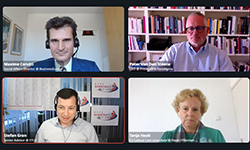 Mutual trust between management and labour is the main driver that can improve the functioning of European works councils in practice. BusinessEurope supports the development of social dialogue at company level through the development of the existing European works councils (EWCs), and by promoting the creation of new ones. This calls for the cooperation between European employers and trade unions, with the support of the European Commission. However, the direction taken by the European Parliament to initiate a legislative report calling for changes in the EWCs 2009 recast directive is counterproductive. By proposing changes to the EWCs recast directive, which would slow down decision making in companies, or blur the difference between EU-wide EWCs consultations and national information and consultation procedures, the European Parliament would bring the social partners apart, rather than promoting social dialogue improvements in diverse EWCs. BusinessEurope remains open to dialogue. But today, let us be clear that we do not see the need for changes to the EWCs recast directive. These were the key messages by Maxime Cerutti, BusinessEurope Social Affairs Director, at the webinar on “The future of the EWCs directive”, organised by the Presence group on 28 June. Watch his video intervention.
Mutual trust between management and labour is the main driver that can improve the functioning of European works councils in practice. BusinessEurope supports the development of social dialogue at company level through the development of the existing European works councils (EWCs), and by promoting the creation of new ones. This calls for the cooperation between European employers and trade unions, with the support of the European Commission. However, the direction taken by the European Parliament to initiate a legislative report calling for changes in the EWCs 2009 recast directive is counterproductive. By proposing changes to the EWCs recast directive, which would slow down decision making in companies, or blur the difference between EU-wide EWCs consultations and national information and consultation procedures, the European Parliament would bring the social partners apart, rather than promoting social dialogue improvements in diverse EWCs. BusinessEurope remains open to dialogue. But today, let us be clear that we do not see the need for changes to the EWCs recast directive. These were the key messages by Maxime Cerutti, BusinessEurope Social Affairs Director, at the webinar on “The future of the EWCs directive”, organised by the Presence group on 28 June. Watch his video intervention.
Contact: Isaline Ossieur
An enabling investment environment in the EU must include robust protection mechanisms
 On 28 June, the European Commission – Directorate General for Financial Stability, Financial Services and Capital Markets Union – organised a Forum on protecting and facilitating investments in the Single Market. During the discussion, Sofia Bournou, Senior Adviser in the International Relations Department of BusinessEurope, stated: “What is fundamental for us is that, in the current environment where we face war on our continent, the impact of the COVID-19 pandemic, and the need to achieve the green and digital transformation of our economy, the EU remains an open and enabling environment for investments, including intra-EU investments of course”. For BusinessEurope, an environment friendly to investors also includes clear and robust rules on the protection of investments. Following the termination of the so-called intra-EU Bilateral Investment Treaties (BITs), a gap is left, which is not easy to fill with the use of existing instruments, such as SOLVIT, the Single Market Enforcement Taskforce (SMET), or the annual Rule of Law report provided by the European Commission. However, we view these instruments as complementary to a tool that is developed with the principles and needs of investment protection in mind, and we will continue to advocate for policy action towards this direction.
On 28 June, the European Commission – Directorate General for Financial Stability, Financial Services and Capital Markets Union – organised a Forum on protecting and facilitating investments in the Single Market. During the discussion, Sofia Bournou, Senior Adviser in the International Relations Department of BusinessEurope, stated: “What is fundamental for us is that, in the current environment where we face war on our continent, the impact of the COVID-19 pandemic, and the need to achieve the green and digital transformation of our economy, the EU remains an open and enabling environment for investments, including intra-EU investments of course”. For BusinessEurope, an environment friendly to investors also includes clear and robust rules on the protection of investments. Following the termination of the so-called intra-EU Bilateral Investment Treaties (BITs), a gap is left, which is not easy to fill with the use of existing instruments, such as SOLVIT, the Single Market Enforcement Taskforce (SMET), or the annual Rule of Law report provided by the European Commission. However, we view these instruments as complementary to a tool that is developed with the principles and needs of investment protection in mind, and we will continue to advocate for policy action towards this direction.
Contact: Sofia Bournou
Debate on the geopolitical impact of the energy transition
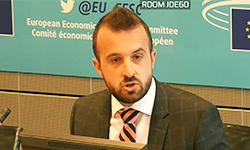 Participating in a hearing on the impact of Europe’s energy transition in the new geopolitical context following the Russian invasion of Ukraine, Nick Bitsios, Chairman of BusinessEurope’s Energy and Climate Working Group pointed out the necessity of pairing ambitious targets and stringent regulations with sufficient incentives, investment and support; so that Europe remains a climate leader not only on paper, but also in practice. The event was organised by the European Economic and Social Committee (EESC) on 21 June. Bitsios stated that while in the long run, the green transition will contribute to making the EU less dependent on fossil fuel imports, there are pressing decisions on the table right now that will determine the success or failure of the EU on this path. This includes sufficient and reliable carbon leakage protection mechanisms as the basis for any low-carbon business cases in the EU. In addition, lawmakers will need to cut administrative and permitting periods significantly, facilitate investment in key technologies such as hydrogen, and increase spending on the physical infrastructure necessary to enable the transition. Committee members inquired about BusinessEurope’s position on various legislative proposals currently under negotiation with the co-legislators.
Participating in a hearing on the impact of Europe’s energy transition in the new geopolitical context following the Russian invasion of Ukraine, Nick Bitsios, Chairman of BusinessEurope’s Energy and Climate Working Group pointed out the necessity of pairing ambitious targets and stringent regulations with sufficient incentives, investment and support; so that Europe remains a climate leader not only on paper, but also in practice. The event was organised by the European Economic and Social Committee (EESC) on 21 June. Bitsios stated that while in the long run, the green transition will contribute to making the EU less dependent on fossil fuel imports, there are pressing decisions on the table right now that will determine the success or failure of the EU on this path. This includes sufficient and reliable carbon leakage protection mechanisms as the basis for any low-carbon business cases in the EU. In addition, lawmakers will need to cut administrative and permitting periods significantly, facilitate investment in key technologies such as hydrogen, and increase spending on the physical infrastructure necessary to enable the transition. Committee members inquired about BusinessEurope’s position on various legislative proposals currently under negotiation with the co-legislators.
Contact: Steffen Engling
Technology infrastructures are a seed for collaboration
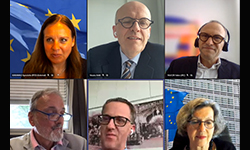 “Collaboration is key for research and innovation”, stressed Norbert Luetke-Entrup, Chair of the BusinessEurope’s Research & Innovation Working Group, at the high-level conference “The role of technology Infrastructures in the Pact for Research & Innovation”, co-organised by the EU French Council Presidency, the European Commission, the French Alternative Energies and Atomic Energy Commission and the European Association of Research and Technology on 23 June. “Research and innovation networks provide strong incentives, attract additional innovative talents and regularly succeed in turning inventions into innovations”, Luetke-Entrup highlighted. He confirmed that the EU has a good number of knowledge clusters but there is still room for improvement. “Technology infrastructures are an important ingredient to seed and grow technology clusters”, he explained, adding that well-run technology infrastructures are more than just the hardware: they come along with a network of partners, and more importantly they foster collaboration and partnerships. With technology infrastructures also naturally attracting private investments, the EU shall see technology infrastructures in a system / value-chain approach and as one of the solutions to better spread its own investment funds.
“Collaboration is key for research and innovation”, stressed Norbert Luetke-Entrup, Chair of the BusinessEurope’s Research & Innovation Working Group, at the high-level conference “The role of technology Infrastructures in the Pact for Research & Innovation”, co-organised by the EU French Council Presidency, the European Commission, the French Alternative Energies and Atomic Energy Commission and the European Association of Research and Technology on 23 June. “Research and innovation networks provide strong incentives, attract additional innovative talents and regularly succeed in turning inventions into innovations”, Luetke-Entrup highlighted. He confirmed that the EU has a good number of knowledge clusters but there is still room for improvement. “Technology infrastructures are an important ingredient to seed and grow technology clusters”, he explained, adding that well-run technology infrastructures are more than just the hardware: they come along with a network of partners, and more importantly they foster collaboration and partnerships. With technology infrastructures also naturally attracting private investments, the EU shall see technology infrastructures in a system / value-chain approach and as one of the solutions to better spread its own investment funds.
Contact: Carolina Vigo
Business views on the proposed revision of the Industrial Emissions Directive
 “The new proposed requirements lead to legal uncertainties, risk to prolong and complicate the permit procedures and undermine the ongoing industrial transformation”, says BusinessEurope in a position paper on the proposed revision of the Industrial Emissions Directive (IED 2.0) published on 29 June. The Industrial Emissions Directive is the main EU instrument regulating pollutant emissions from industrial installations, with a current coverage scope of around 52.000 installations in Europe. The European Commission adopted its revision proposal on 5 April with the aims of progressing towards the EU’s zero pollution ambition for a toxic-free environment and supporting climate, energy and circular economy policies. While appreciating the Commission’s intentions, BusinessEurope’s paper explains that the current proposal does not reach these goals. Companies are also concerned about the possible overlapping legislation and inconsistencies when the entire EU’s sustainability legislative framework is under revision. This means that the expected benefits are likely to be overstated.
“The new proposed requirements lead to legal uncertainties, risk to prolong and complicate the permit procedures and undermine the ongoing industrial transformation”, says BusinessEurope in a position paper on the proposed revision of the Industrial Emissions Directive (IED 2.0) published on 29 June. The Industrial Emissions Directive is the main EU instrument regulating pollutant emissions from industrial installations, with a current coverage scope of around 52.000 installations in Europe. The European Commission adopted its revision proposal on 5 April with the aims of progressing towards the EU’s zero pollution ambition for a toxic-free environment and supporting climate, energy and circular economy policies. While appreciating the Commission’s intentions, BusinessEurope’s paper explains that the current proposal does not reach these goals. Companies are also concerned about the possible overlapping legislation and inconsistencies when the entire EU’s sustainability legislative framework is under revision. This means that the expected benefits are likely to be overstated.
![]() Contact: Carolina Vigo
Contact: Carolina Vigo
Calendar 
- 21 August - 2 September: European Forum Alpbach 2022
- 26-30 September: European Sustainable Energy Week 2022
Not yet a subscriber? Register here.
Reminder: please have a look at our privacy policy